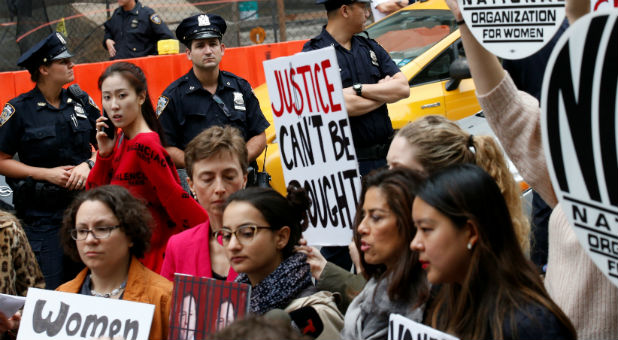[ad_1]

A sad, revealing movement has risen out of the scandal surrounding Hollywood media mogul Harvey Weinstein. If you’ve been online the past two days, you’ve likely seen #MeToo across your social media feeds. The hashtag marks women who’ve been the victims of sexual assault or harassment at some time in their lives.
Among the #MeToo voices are prominent Christian leaders including Beth Moore, Alveda King and Karen Swallow Prior, as Charisma News previously reported. I applaud these women for speaking up. Their courage sends the message, “We are the church and we’ve been there too.”
The church is comprised of sinners and operates in a sin-sick world, therefore it is not immune to sexism and misogyny. We know the Christian journey isn’t a cookie-cutter path after we surrender our lives to Jesus Christ. We easily admit this when it comes to financial hardships, broken relationships and persecution for the faith. So why does it still feel taboo for Christians to admit they’ve been sexually victimized too?
I’ve written a lot about cafeteria-style Christianity, where some believers like to pick and choose which topics are relevant, as if the gospel is a buffet line. Note this is not just a temptation for progressive Christians. All of us are guilty of this at times. And for some reason, talk of rape, incest, and even emotional and physical abuse still cause us a measure of awkward discomfort.
It’s not that our small-group leaders, Bible teachers and pastors are implicitly denying or dismissing victims. I strongly believe most wish to compassionately and thoughtfully disciple victims through recovery. They just don’t know how.
With better training in godly counsel and understanding of trauma and defensive safeguards common to survivors of this abuse, local churches can be a place of shelter for victims’ recovery. Then congregants can say to victims outside of our sanctuary walls, “We’ve been through this too. Let’s process your pain together. And let me introduce you to our Savior’s transformative healing and grace.”
We shouldn’t wait until something like the #MeToo movement happens in mainstream culture to start talking about sexual assault and harassment. Instead of being reactionary, local churches can implement practical and prayerful ways to minister to victimized women and men inside and outside our sanctuary walls. It should be a part of our missional strategy.
Before we minister to the heart, Christians must first aim to care for a person’s basic needs, right? If you’re hungry, we feed you. If you’re naked, we clothe you. If you are sick or in prison, we visit you. How about if you’ve been violated and rejected, we counsel you? If you’re powerless, we protect you. If you’ve lost your voice, we advocate for you, and if you’re hurting, we support you.
Finally, the church should take the #MeToo movement seriously, lest we tarnish our public witness for Jesus Christ.
A young woman very close to me was raped at 15 years old by a young man she considered her good friend. During her attack, she cried out to God for help. Having grown up in a Pentecostal church her whole life she couldn’t understand why the Holy Spirit did not intervene and for what purpose she had to endure such a traumatic assault. She grew angry with God and frustrated with her church members’ failure to answer her questions and minister to her wounds.
Every day I pray for this young woman’s return to the church. Her story serves as a reminder our love for sisters, friends and neighbors should compel us to remember it takes work to be triumphant, and the church’s witness is a shining light in the darkest places. As Matthew 5:14 tells us, “You are the light of the world. A city that is set on a hill cannot be hidden.”
They eyes of a fallen world are watching us. They must see the church serves to protect victims, not create more. ![]()
Chelsen A. Vicari is the evangelical action director at the Institute on Religion & Democracy.
Readers are Leaders! Subscribe now and get 3 magazines for the price of 1. Get Charisma, Ministry Today and SpiritLed Woman all for $24. YES – Sign me up!
3 Reasons Why you should read Life in the Spirit. 1) Get to know the Holy Spirit. 2) Learn to enter God’s presence 3) Hear God’s voice clearly! Click here to draw closer to God!
[ad_2]
Source link



